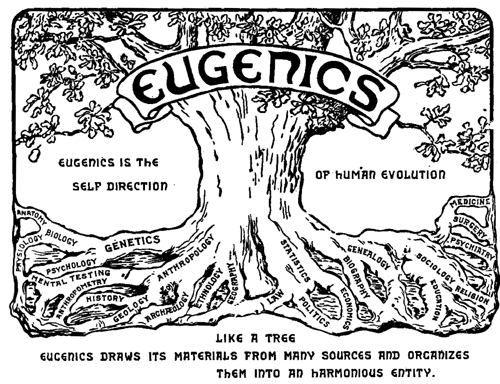On Eugenics
"[U]nless we mobilize the courage to look foursquare at the full human meaning of our new enterprise in biogenetic technology and engineering, we are doomed to become its creatures if not its slaves….[I]t is not too late…to become aware of the dangers, not just to privacy or insurability, but to our very humanity. So aware, we might be better able to defend the increasingly beleaguered vestiges and principles of our human dignity, even as we continue to reap the considerable benefits that genetic technology will inevitably provide."
-Leon R. Kass, Addie Clark Harding Professor in the Committee on Social Thought and the College of the University of Chicago

Introduction to Eugenics
Eugenics is a philosophy that, most generally, deals with the improvement of the human being through variations in hereditary traits. While the science is most vast and fascinating, this website will address its role in science fiction and film. In so doing, it will also raise philosophical questions about the issue in culture, particularly the role that humanity plays in the advancement of scientific technology.
Eugenics in Science Fiction
Ever since Aldous Huxley predicted the future of genetically-engineered society, authors and directors of science fiction have been intrigued by the positive and negative results of such technology and its contemporary practice. With the successful cloning of Dolly, modern authors and film producers have, in particular, taken interest in the ramifications of such science.
This website will only address key examples of science fiction that deal with eugenics and genetic-engineering, but it also intends to foment dialogue surrounding these issues. For additional information and a list of related works, please consult the links section of the site.
The Controversy
From the extremes of universal acceptance and uncompromising rejection, there are a plethora of views concerning the looming question: Where do we draw the line? As some scholars feel, genetic engineering will do nothing spectacular. Gina Maranto writes, in Quest for Perfection: The Drive to Breed Better Human Beings: "Humans have long since possessed the tools for crafting a better world. Where love, compassion, altruism and justice have failed, genetic manipulation will not succeed." For many, genetic engineering will never replace the flaws of human nature which surpasses physical characteristics.
Others maintain views radically open to the possibility of cloning and genetic engineering of human beings. As Gregory Pence, professor of Philosophy at the University of Alabama, writes: "Many people love their retrievers and their sunny dispositions around children and adults. Could people be chosen in the same way? Would it be so terrible to allow parents to at least aim for a certain type, in the same way that great breeders…try to match a breed of dog to the needs of a family?" Or as Richard Lynn puts it: "What is called for here is not genocide, the killing off of the population of incompetent cultures. But we do need to think realistically in terms of the 'phasing out' of such peoples . . . Evolutionary progress means the extinction of the less competent."
